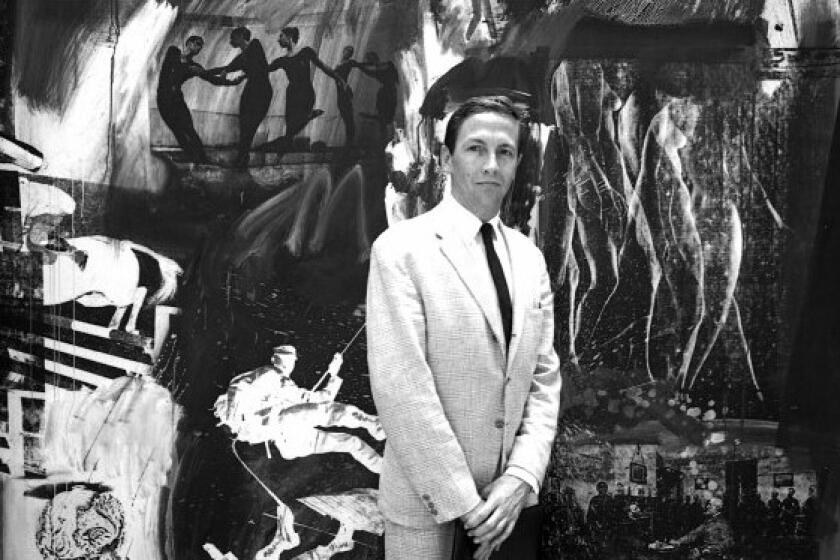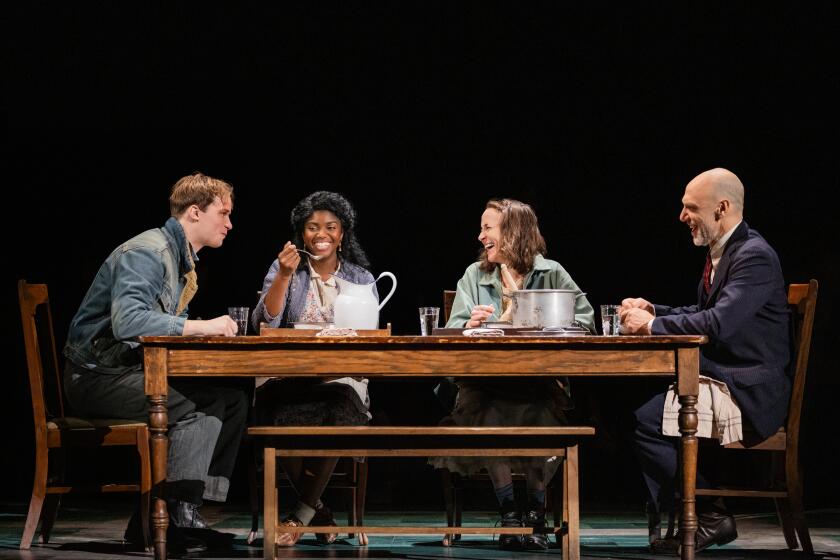A Sparkling ‘Much Ado,’ Circa 1930
Brush up your Capra, your Hawks, your Astaire. At South Coast Repertory, Mark Rucker’s staging of Shakespeare’s “Much Ado About Nothing” is inspired by ‘30s Hollywood movies.
Douglas Sills, who looks more like a ‘30s matinee idol than just about any other actor working today, plays Benedick. He begins with comic preening, punctuated by a quick double “uh-huh” whenever Benedick affirms his own cleverness. But Sills makes Benedick’s maturation crystal clear. Nike Doukas, born to be Beatrice, goes through a similar transformation.
This inventive and shiny “Much Ado” pales only in comparison to Rucker’s even more spectacular “The Taming of the Shrew” in the same theater five years ago. But it also sets up one expectation that’s unmet--that it will be as brisk and as brief as most of those vintage screwball comedies and gangster flicks were. At 15 minutes shy of three hours (including intermission), it’s a little too much ado. However, Rucker can rightfully say that he respected Shakespeare’s text even as he re-imagined its context.
The play is still ostensibly set in Messina, Sicily--but this is a Sicily that exists only on a sound stage. The first scene doubles the number of people in Shakespeare’s original, so the early verbal jousting between Beatrice and Benedick is a very public contest. The women are trying on new hats--a big deal in ‘30s movies.
We soon meet the play’s villains, perfect ‘30s types. Don John (Joshua Fardon) looks and sounds like the crooked boss of a political machine. He steps out of a shower to receive a towel from his valet (John-David Keller) as he forthrightly declares his wickedness. His henchman Borachio (Michael Louden) does a nifty take on Cagneyesque style.
The play’s early party scene is catnip for Rucker. Costumer Walker Hicklin makes everyone look glamorous. Note Don John’s black mask instead of the silvery visors worn by the others. The men do a novelty rendition of “I’m in the Mood for Love.” Benedick mimics Clark Gable’s famous “Frankly, my dear” line. Antonio (Don Took) does a brief Durante shtick.
The concept’s high point is the scene, used as a first act climax, in which Benedick eavesdrops on his comrades, who actually know he’s there. First, Balthasar (Todd Murray) sings the text’s “Sigh no more, ladies” song as a crooner, with a big microphone and lush recorded accompaniment, while his listeners shout out lines like big-band side men. Then Benedick becomes entangled in his lawn chair as he tries to escape the other men’s notice, while they practice archery as they loudly gossip. Benedick is so intrigued by their talk that he almost falls into range of the arrows--a brilliant ‘30s representation of the play’s allusions to Cupid.
*
Beatrice’s complementary eavesdropping isn’t as wonderful, though her circular-framed sunglasses and her loss of one high-heeled shoe add comedy. The second act, with its messy business about the young lovers Claudio and Hero and Dogberry’s unkempt posse, doesn’t match Rucker’s concept quite as well as the first.
Christine Jones’ set--farce-ready screens and steps--has a somewhat restrained palette, like black-and-white movies, and skimps on Art Deco detail. But Christopher Akerlind’s lighting adds color. With contributions from choreographer Art Manke and composer Dennis McCarthy, the show concludes with a smashing curtain call right out of a ‘30s musical.
* “Much Ado About Nothing,” South Coast Repertory, 655 Town Center Drive, Costa Mesa. Tuesdays-Saturdays, 8 p.m.; Sundays, 7:30 p.m.; Saturdays-Sundays, 2:30 p.m. Ends April 1. $28-$49. (714) 708-5555. Running time: 2 hours, 45 minutes.
Much Ado About Nothing
Douglas Sills: Benedick
Nike Doukas: Beatrice
Andrew Heffernan: Claudio
Julia Coffey: Hero
Tony Pasqualini: Leonato
Preston Maybank: Don Pedro
Joshua Fardon: Don John
Michael Louden: Borachio
John-David Keller: Conrad
Don Took: Antonio
Todd Murray: Balthasar
Marika Becz: Margaret
Martha McFarland: Ursula
Robert Dorfman: Dogberry
Hal Landon Jr.: Verges
Art Koustik: A Sexton
Richard Doyle: Friar Francis
Sound by B.C. Keller. Stage manager Scott Harrison.
More to Read
The biggest entertainment stories
Get our big stories about Hollywood, film, television, music, arts, culture and more right in your inbox as soon as they publish.
You may occasionally receive promotional content from the Los Angeles Times.






